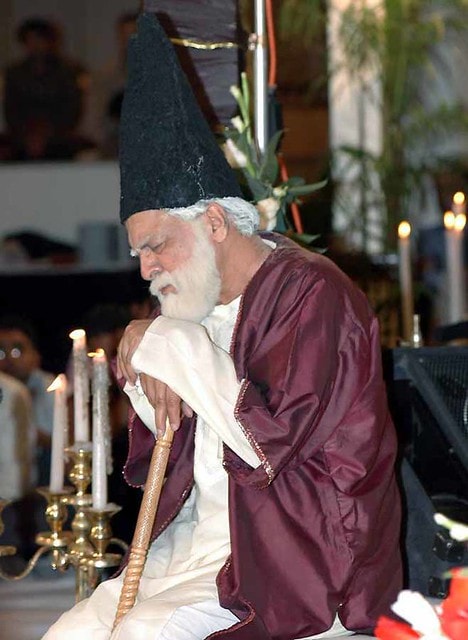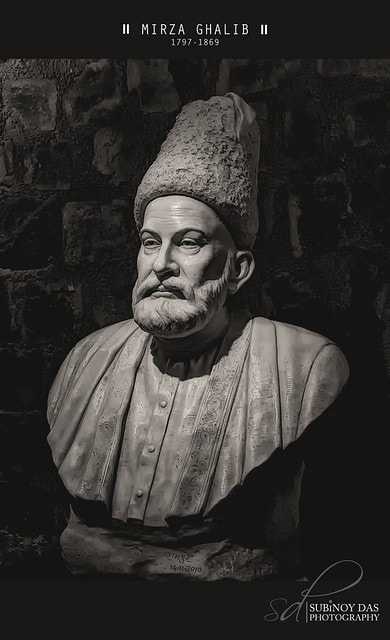If you want to know a quick answer of these questions, like who is Mirza Ghalib? About Mirza Ghalib, Biography of Mirza Ghalib, history of Mirza Ghalib, So please read our quick and short description about Mirza Ghalib in below:
Mirza Ghalib: Short Description about Mirza Ghalib!
| Country | Indian |
| Full Name of Mirza Ghalib | Mirza Ghalib |
| Nick Name of Mirza Ghalib | Mirza Ghalib |
| Born of Mirza Ghalib | 27 December 1797 |
| Death of Mirza Ghalib | 15 February 1869 |
| Born Place of Mirza Ghalib | Agra, Mughal Empire |
| Death Place of Mirza Ghalib | Gali Qasim Jaan, Ballimaran, Chandni Chowk, (Now Ghalib Ki Haveli, Delhi) |
| Father of Mirza Ghalib | Mirza Abdullah Baig Khan |
| Mother of Mirza Ghalib | Izzat-Ut-Nisa Begum |
| Brothers of Mirza Ghalib | No |
| Sisters of Mirza Ghalib | No |
| Married | Yes |
| Wife of Mirza Ghalib | Umrao Begum |
| Son of Mirza Ghalib | – |
| Daughter of Mirza Ghalib | – |
Introduction:
पूछते हैं वो की ‘ग़ालिब ‘ कौन है ?
कोई बतलाओ की हम बतलायें क्या
“They ask who is ‘Ghalib’?
Tell anybody do we tell”
Friends, if we are talking about Shayari, then the name of Mirza Ghalib comes first. Mirza Ghalib is called Sarataz of Urdu poetry. Let’s say that the poetry begins with Mirza Ghalib. Ghalib, the Mughal period is considered to be one of the most popular and influential poets of Urdu language. Today, Ghalib is popular not only in India and Pakistan but across the world. Most of the poems and ghazals of Mirza Ghalib are sung in various Bollywood films. Mirza Ghalib wrote about himself that there are many great poets and Sayers in the world, but he is the most unique because of his writing style.
“हैं और भी दुनिया में सुख़न्वर बहुत अच्छे
कहते हैं कि ग़ालिब का है अन्दाज़-ए बयां और”
Mirza Ghalib was born on 27 December 1796 at Kala Mahal of Agra and his grandfather, Mirza Kukan Beg Khan was an Ottoman who had come to India from Samarkand (now in Uzbekistan) during Ahmad Shah (1748-54) reign.
His father Mirza Abdullah Beg Khan worked in Lahore, Delhi and Jaipur at the Nawab of Lucknow. And finally settled in Agra’s black Mahal. In, 1803, when Mirza Ghalib was 5 years old his father died at Alwar and was buried in Rajgarh (Alwar, Rajasthan). He was adopted by his uncle Mirza Nasrullah Baig Khan and raised him up.
Education:
Galiib’s initial education cannot be said clearly. But according to Ghalib, he started writing prose and verse in Urdu and Persian from the age of 11 years. He wrote mostly compositions on traditional devotion and beauty in Persian and Urdu which is written in Ghazal. He wrote the traditional song in both Persian and Urdu in the mysterious-romantic style of poetry and is widely known as Ghazal.
Marriage Life of Mirza Ghalib
At the age of 13, Mirza Ghalib got married to 11 year old Umrao Begum. According to some historians, his wife played a major influence in Mirza Ghalib’s life. There is a replica of their marital life in their shayari somewhere. But even then does not get much information about the Mirza Ghalib’s wife in the history.
Mirza Ghalib had described marriage as a prison in life. The evidence is found in the condolence letter of his friend’s wife, in which Mirza wrote that “I am sorry. But also envy him let us assume! He has been relieved of his chains and here I am walking about half a century with his noose. “There is a sad side in Mirza Ghalib’s marital life that Ghalib had been blessed with seven children, but none of the seven children could not escape. That is why he had adopted two bad habits, one wine and other gambling. Both of these habits could not stand up to their death.
Journey to Mirza Ghalib’s Sayari life:
After marriage at the age of 13, Mirza came to Delhi along with her Begum and brother Mirza Yusuf Khan. After coming to Delhi, he came to know that a poet is required to teach Sher-i-Shayari to Fakr-ud-Din Mirza, son of Mughal emperor Bahadur Shah Zafar. After which Mirza Ghalib started teaching the elder son of Bahadur Shah Zafar to the depths of Sher-e-Shayari.
Bahadur Shah Zafar was also a poet, along with being a big fan of Urdu Shayari. That is why Mirza ka Ghazal used to be interested in reading Sher-O-Shayari. Gradually Mirza Ghalib joined the special court of the court. In his poetry his failed love and life generation were not shown only, but the mysticism of biology is also depicted. In 1850, Shahanshah Bahadur Shah Zafar gave Mirza Ghalib the title of Debir-ul-Mulk and Najm-ud-Daula. He later got Mirza Noshiba’s title also.
Mirza Ghalib’s life changed completely after the Revolution of 1857 in the freedom struggle, the Mughal army was defeated by the British Raj, after which the British send Bahadur Shah to Rangoon. By which the Mughal Darbar was destroyed. Mirza were also ceased to receive income. During this time Mirza Ghalib did not have enough money to eat. He started going to small festivals and impressed people with his shayari. Mirza, the finest sharia of his life, was written at this time, due to this, Mirza was also called as “Shayar of the common people”.
Ghalib was a great shayar and knew this. The Ghalib never let anyone go to the shayar. The famous Merciagoshire Mir Anis was not for Misra Ghalib but is perfectly for him. This eye is the one which no one is liking.
However, during his time many big shayar passed. Hakim Momin Khan Momin, Mohammed Ibrahim Kha Zouq, and Khwaja Hadar Ali Atish and many more names can be found here. But almost 75 years ago a shayar was born, whose name was Mir Taki Mir. If Ghalib is consider as “Shayari’s iron” in his life that was only Mir. He has also thrown this thing into his shayari.
रेख़्ता के तुम्हीं उस्ताद नहीं हो ग़ालिब,
कहते हैं अगले ज़माने में कोई मीर भी था.
Mirza Ghalib’s death
Mirza Ghalib’s last year was cut off in anonymity, but Spot reply till the last moment of life. The epidemic spread in Delhi in the last time. He wrote a letter in a narrow message to his beloved friend and said, “How is pestilence? When the seventy-seven-year old – could not kill the old man and lady. ”
One more example of this is found in another place: Ghalib’s body was very painful in the last days. He used to moan in pain on the bed. One day they were moaning with pain. Then the servant arrived and press his feet. When Ghalib refused to do so, the servant said, ‘If you are feeling bad, then you can give me the wages for pressing the foot’. On this, Ghalib said, ‘Okay.’ After the foot was pressed, the servant asked for his wages. Despite the pain he laughed and said, “What kind of wages brother you pressed my feet, I pressed your money. Accounts Settled.”
Mirza Ghalib died on 15 February 1869 but it was surprising that two days after the death of a great poet like Mirza Ghalib, this news appeared for the first time in Urdu newspaper Akmal-ul-Akbar. Interestingly, the death of Umayra Begum, the wife of the shayar who imprisoned the marriage, has died one year later. The graves of both were made in Delhi’s Nizamuddin area.
For a century after the death, this grave was in contact with the Panchtattvas. But in 1955 an organization named Ghalib Society created a structure of white marble on the tomb. Mirza Ghalib’s poetry gets a glimpse of the pain. This shows that life is an endless struggle that ends with death.
Serials and films on Mirza Ghalib:
The film was made on Mirza Ghalib in 1954. Whose name was “Mirza Ghalib”. Bharat Bhushan played Mirza Ghalib in this film and directed by Saurabh Modi. this film also received the National awarded for “Best Film”. I n 1961 a film on Mirza Ghalib has also been made by Pakistan. In 1988, Gulzar’s TV serial “Mirza Ghalib” was popular on television. Mirza Ghalib’s character was played by Naseeruddin Shah in this show.
Mirza Ghalib books
- Diwan-e-Ghalib
- Mirza Ghalib (Hindi)
- Galib: Ek Jeevanee (Autobiography of Mirza Ghalib)
- Ghalib: Innovative Meanings and the Ingenious Mind
Mirza Ghalib is a star glowing in the sky of Urdu and Persian poetry. Those whom we still remember with heart
“पीने दे शराब मस्जिद में बैठ के , ग़ालिब
या वो जगह बता जहाँ खुदा नहीं है”
“ख्वाहिशों का काफिला भी अजीब ही है ग़ालिब
अक्सर वहीँ से गुज़रता है जहाँ रास्ता नहीं होता”
“दर्द हो दिल में तो दवा कीजिये
दिल ही जब दर्द हो तो क्या कीजिये”
“तेरे हुस्न को परदे की ज़रुरत नहीं है ग़ालिब
कौन होश में रहता है तुझे देखने के बाद”
“हुई मुद्दत के ग़ालिब मर गया, पर याद आती है
जो हर एक बात पे कहना की यूं होता तो क्या होता”
“हाथों की लकीरो पे मत जा ग़ालिब
नसीब उनके भी होते है जिनके हाथ नहीं होते”
“उम्र भर हम भी गलती करते रहे ग़ालिब
धुल चेहरे पे थी और हम आईना साफ़ करते रहे”
“इश्क़ ने ग़ालिब निकम्मा कर दिया
वरना हम भी आदमी थे काम के”
